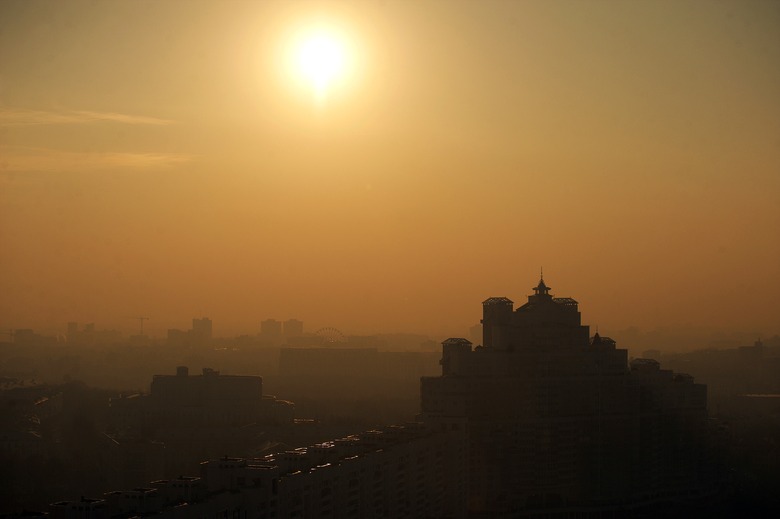2018 Was The Fourth Hottest Year On Record – Here's What That Means For You
If you've been following climate change news for a while, you already know that 2018 was a rough year.
People all around the world experienced some of the worst side effects of global warming last year. California, often plagued by droughts related to climate change, suffered several massive wildfires – including the Camp Fire, a fire last November that temporarily made Northern California's air the worst in the world.
Across the pond, rising sea levels caused by climate change risk erasing parts of our heritage. As the New York Times reports, rising tides threaten to flood Scotland's Orkney Islands, which are home to 5,000-year-old ruins. And a new report shows that India's summers – already dangerously sweltering during heat waves – might soon become life-threateningly hot most of the time.
So it may be no surprise to you that 2018 was among the hottest on record. But now we know for sure.
Scientists at NASA announced last Wednesday that 2018 was the fourth hottest year on record – at least, of the past 140 years when they've been collecting data. And it continues the overall upward trend in global temperatures we've seen because of global warming.
So, How Hot was 2018, Exactly?
So, How Hot was 2018, Exactly?
To get the best idea of how warm the planet is getting, scientists compare temps today to those way back in the late 19th Century, when global warming due to human activity started taking off. That's when industrialization meant humans were pumping way more carbon dioxide into the air – releasing plenty of greenhouse gases and starting the climate trend we're seeing today.
NASA's study reports that 2018 was about 1.8 degrees Fahrenheit – or 1 degree Celsius – above the average temperature in the late 19th century. It was also 1.5 degrees Fahrenheit, or about 0.8 degrees Celsius, warmer than the average temperatures recorded from 1951 to 1980, NASA reports.
That's slightly cooler than the past two years. 2016 was an average of 1.2 degrees Celsius (about 2.2 degrees Fahrenheit) warmer than the pre-industrial era, and 2017 was about 1.1 degrees Celsius (2 degrees Fahrenheit) warmer.
But there's still a seriously concerning upward trend in average global temperature. The past five years make up the entire top 5 warmest years overall. And 18 of the top 19 warmest years happened after 2001 – which means the past 20 years make up almost the entire top 20 warmest years on record, according to NASA's report.
TL;DR (Too Long; Didn't Read)
Curious how much global warming you're experiencing at home? Try out [this handy tool](https://www.nytimes.com/interactive/2018/08/30/climate/how-much-hotter-is-your-hometown.html?rref=collection%2Fsectioncollection%2Fclimate&action=click&contentCollection=climate®ion=rank&module=package&version=highlights&contentPlacement=8&pgtype=sectionfront) to see how much your hometown has warmed up over the years.
What Does This Mean for Combating Climate Change?
What Does This Mean for Combating Climate Change?
We'll be honest: The news isn't good. At 1 degree Celsius, the world is already seeing the effects of climate change. And, as the New York Times reports, we're on track to fall short of the climate warming limit goal laid out in the Paris Climate Agreement, which aimed to limit global warming by 2 degrees Celsius.
So what would 1.5- to 2-degree Celsius global warming look like? Global warming of 1.5 degrees Celsius would create water scarcity for 350 million people worldwide, and expose up to 69 million people worldwide to an extreme risk of flooding. It would also affect crop growth, reduce animals' habitat ranges, and expose about 14 percent of the world's population to extreme heat, the New York Times reports.
The alarming trend of global warming over the past decades – and especially the past five years – means it's more important than ever to get involved. Get in touch with your representatives and make your voice heard to limit climate change – and protect the environment.
References
Cite This Article
MLA
Tremblay, Sylvie. "2018 Was The Fourth Hottest Year On Record – Here's What That Means For You" sciencing.com, https://www.sciencing.com/2018-was-the-fourth-hottest-year-on-record-heres-what-that-means-for-you-13717221/. 14 February 2019.
APA
Tremblay, Sylvie. (2019, February 14). 2018 Was The Fourth Hottest Year On Record – Here's What That Means For You. sciencing.com. Retrieved from https://www.sciencing.com/2018-was-the-fourth-hottest-year-on-record-heres-what-that-means-for-you-13717221/
Chicago
Tremblay, Sylvie. 2018 Was The Fourth Hottest Year On Record – Here's What That Means For You last modified March 24, 2022. https://www.sciencing.com/2018-was-the-fourth-hottest-year-on-record-heres-what-that-means-for-you-13717221/
